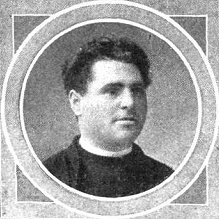Basilio Álvarez

Basilio Álvarez (1877–1943) was a Spanish priest, journalist and politician related to the Galician agrarianist movement. He was deputy by Ourense during the Second Spanish Republic, as a member of the Radical Republican Party.
Biography
Born in Ourense in 1877, was ordained priest in 1902.[1] On 1907 he settled in Madrid,[2][3] although by 1912 would return to Beiro, Galicia.[4][5] His career as a religious was characterized by an unorthodox interpretation of the rules of the Catholic Church, where there is no choice of celibacy[5] —but in fact came to have two children.[6] These circumstances, among others, were the reason that between 1914 and 1928 was suspended by the Church.[7] He has been described as a "picturesque" personality.[8]
On his journalistic work he collaborated in publications such as La Nueva Época,[9] El Eco,[2][10] Galicia,[2] Acción Gallega, El Parlamentario or La Zarpa.[11] He was also director of the Catholic newspaper El Debate[7][2][12] and author of works such as El cural rural (1904),[2][3][13] Por los agros celtas (1907),[14] El libro del periodista (1912),[4][15] Abriendo el surco (1913),[14] among others. His works and his meetings were in Spanish language.[16]
He was one of the founders of the movement Acción Gallega, linked to the Galician agrarianist movement.[3][4][17] He was known for his criticism of the caciquismo as an agricultural agreement that dominated medieval Galicia known as "foro".[18] After 1913 he began to closer his speech to the workers movement[19] and around 1915 Basilio Álvarez proposed collaboration with socialists and republicans.[20] Opposite to centralism, advocated a federal structure in Spain. Some have drawn parallelism s between the rhetorical style and language of Álvarez —which has come to be described as "incendiary",[5] "cult",[21] passionate[22] or "Baroque"—[4][21] with those of Alejandro Lerroux.[23] Basilio Álvarez was a "charismatic orator".[24]
In the early 1930s he joined the Radical Republican Party,[25][26] with which it secured the 1931 deputy act for the circumscription of Ourense.[13] He however left the group in 1935,[27] for to be a member of a party the ephemeral Manuel Portela Valladares' Party of Democratic Center in 1936.[27] Following the outbreak of the Spanish Civil War he went into exile. He died in 1943 in Tampa, Florida.[27]
Notes
- ^ Tezanos Gandarillas 1997, pp. 151–178.
- ^ a b c d e Durán 1973, p. 21.
- ^ a b c Cabo Villaverde 2013, p. 114.
- ^ a b c d Durán 1973, p. 22.
- ^ a b c Cabo Villaverde 2013, p. 130.
- ^ Tezanos Gandarillas 1997, pp. 154, 163.
- ^ a b Vicente Algueró 2012, p. 313.
- ^ Vicente Algueró 2012, pp. 312–313.
- ^ Tezanos Gandarillas 1997, p. 153.
- ^ Cabo Villaverde 2013, p. 154.
- ^ Tezanos Gandarillas 1997, p. 166.
- ^ Tezanos Gandarillas 1997, pp. 154–155.
- ^ a b Tezanos Gandarillas 1997, p. 154.
- ^ a b Cabo Villaverde 2013, p. 115.
- ^ Tezanos Gandarillas 1997, p. 155.
- ^ Cabo Villaverde 2013, p. 124.
- ^ Tezanos Gandarillas 1997, p. 157.
- ^ Tezanos Gandarillas 1997, pp. 159–161.
- ^ Cabo Villaverde 2013, pp. 128–129.
- ^ Tezanos Gandarillas 1997, p. 162.
- ^ a b Tezanos Gandarillas 1997, p. 175.
- ^ Tezanos Gandarillas 1997, p. 172.
- ^ Cabo Villaverde 2013, pp. 123–124.
- ^ Tezanos Gandarillas 1997, pp. 159, 175.
- ^ Vicente Algueró 2012, p. 312.
- ^ Tezanos Gandarillas 1997, pp. 167–168.
- ^ a b c Tezanos Gandarillas 1997, p. 174.
Bibliography
- Cabo Villaverde, Miguel (2013). "Acción Gallega: Populismo agrario y cambio político en la Galicia de la Restauración, 1912-1915". Segle xx. Revista catalana d'història (in Spanish) (6). Catarroja: Afers: 113–131. ISSN 2339-6806.
{{cite journal}}: Invalid|ref=harv(help) - Durán, José Antonio (30 June 1973). "Basilio Álvarez: radiografía de un agitador". Triunfo (in Spanish) (561): 21–23. ISSN 0211-2868. OCLC 704012177.
{{cite journal}}: CS1 maint: ref duplicates default (link) - Tezanos Gandarillas, Marisa (1997). "Basilio Álvarez: "una sotana casi rebelde"" (PDF). Espacio, tiempo y forma. Serie V, Historia contemporánea (in Spanish) (10). Madrid: Universidad Nacional de Educación a Distancia: 151–178. ISSN 1130-0124. OCLC 722124019.
{{cite journal}}: Invalid|ref=harv(help) - Vicente Algueró, Felipe-José de (2012). El catolicismo liberal en España (in Spanish). Madrid: Encuentro. ISBN 978-8-499-20124-5. OCLC 779876611.
{{cite book}}: Invalid|ref=harv(help)
